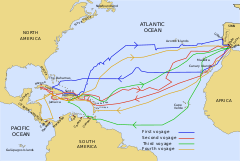Columbus's first voyage
In 1492 a Spanish-based transatlantic maritime expedition led by Christopher Columbus encountered the Americas, a continent which was previously unknown in Europe, leading to the colonization of the Americas.
Columbus, and his crew became the first Europeans to make landfall in the Americas. Columbus was an Italian–born navigator sailing for the Crown of Castile in search of a westward route to Asia, to access the sources of spices and other oriental goods. This led to the discovery of a New World between Europe and Asia. Columbus made a total of four voyages to the Americas between 1492 and 1502, setting the stage for the European exploration and colonization of the Americas, ultimately leading to the Columbian Exchange.
At the time of the voyages, the Americas were inhabited by the indigenous Americans, the descendants of peoples from Asia who crossed the Bering Strait, at that time a land bridge, to North America beginning around 20,000 years ago. Columbus's voyages led to the widespread knowledge that a new continent existed west of Europe and east of Asia. This breakthrough in geographical science led to the exploration and colonization of the New World by Spain and other European sea powers, and is sometimes cited as the start of the modern era.
...
Wikipedia

